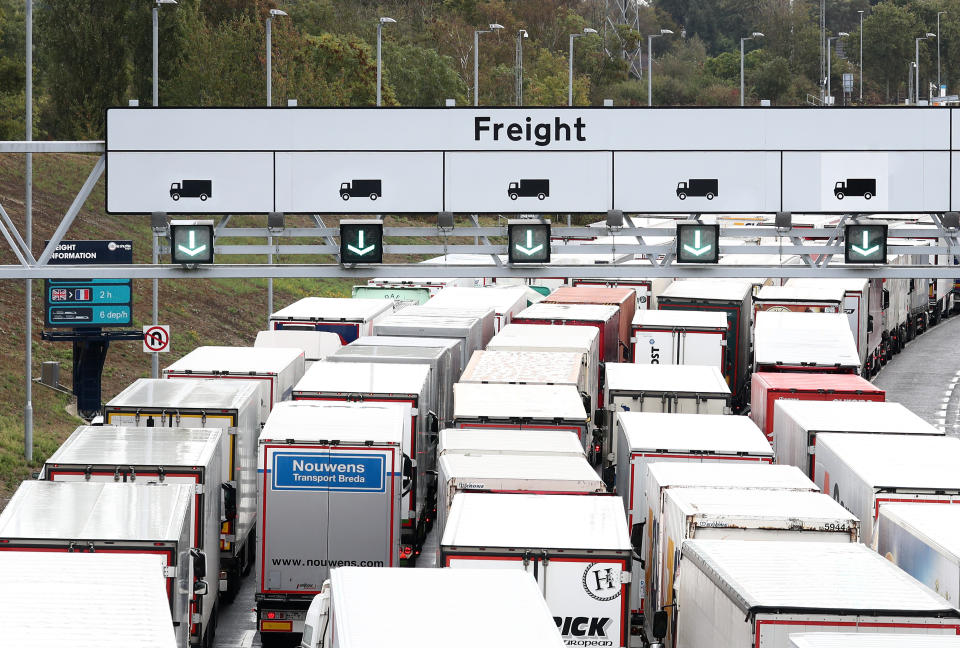From border chaos to EU warnings: What's next for Brexit as talks are set to resume?

It looks to be an eventful week as Brexit negotiations resume on Monday, with the European Union warning it will not budge on its decision to renegotiate the Brexit deal and Britain planning to override parts of the deal on Northern Ireland.
Earlier this week, Germany’s minister of state for Europe, Michael Roth, appealed to the UK government to stop its plans to push through an internal market bill that could see Britain breaking international law.
“Please, dear friends in London, stop the games, time is running out, what we really need is a fair basis for further negotiations and we are ready for that,” Roth said.
“The so-called internal market bill extremely worries us because it violates the guiding principles of the withdrawal agreement,” he continued. “And that is totally unacceptable for us.”
On Friday, The British Retail Consortium (BRC) said grocery stores and their shoppers will face an annual £3.1bn ($4bn) tariff bill for food and drink, unless a free trade deal is secured with the EU.
In May, the UK government released its new tariff schedule, which will come into force by 1 January 2021 if a deal is not agreed. 85% of foods imported from the EU will face tariffs of more than 5%, while the average tariff on food imported from the EU would be over 20%.Under the schedule, there could be a 48% tariff on beef mince, 16% on cucumbers and 10% on lettuce.
Government warns of 7,000-truck-long queues at Dover
Cabinet minister Michael Gove warned that there could be two-day delays in Kent for freight to clear customs after end of Brexit transition period, meaning lorries exporting goods to the EU could be left jammed in 7,000-truck-long queues in Kent.
The “reasonable worst-case-scenario” of possible disruptions ahead was shared in a letter to the freight industry by Gove, who is responsible for no-deal planning.
The major delays will be caused by up to two thirds of freight trucks travelling to the EU being unprepared for new border controls. Up to half of the disruption could be on the busiest “short straits” routes — Dover to Calais and in the Eurotunnel.
From 1 January 2021 the EU is expected to stop all freight without the correct documentation.
The delays could last for three months or longer.
Britain’s government hopes the stark warning will encourage traders to get their documentation ready in time, irrespective of whether or not there is a deal in the UK-EU trade negotiations.
In the event of a no-deal Brexit, hauliers would have to rely on special permits rationed by the Department for Transport. But the freight industry has raised concerns that the government does not have effective plans and systems in place to deal with post-Brexit changes.
UK firms not ready for Brexit transition

A survey by the British Chambers of Commerce (BCC) revealed that UK businesses have “significant unanswered questions” about the end of the Brexit transition period, while around half of firms have done nothing to prepare.
BCC warned thats companies reported having “little cash or information to plan” for the impact of significant changes in UK-EU trade from the end of the year.
It urged the government to be “honest” with firms about the complexity of the new rules, and to issue stronger warnings that businesses need to prepare.
On Thursday, BCC director general Adam Marshall said: “With just 98 days to go, business communities face the triple threat of a resurgent coronavirus, receding government support schemes, and a disorderly end to the transition period.
“Significant unanswered questions remain for businesses, and despite recent public information campaigns, base levels of preparedness are low. Many firms say they've heard talk of deadlines and cliff edges before, and others are still grappling with fundamental challenges as a result of the pandemic and have little cash or information with which to plan.
“The ‘Check, Change, Go’ campaign gives the impression that Brexit-related changes are like getting an MOT — whereas the reality is that for many businesses, they’re more akin to planning a moon landing.”
A separate report by the Confederation of British Industry (CBI) found firms in 10 of 17 sub-sectors of manufacturing reporting production had fallen in the three months to September. Companies said output was 17% below “normal” levels because of COVID-19, and vehicle and transport equipment production saw some of the steepest declines in work.
The survey of 277 firms painted a mixed picture about the sector’s efforts to recover from the heavy toll of lockdown earlier this year and the continued effects of the coronavirus crisis.
No-deal Brexit to hit UK economy ‘three times’ as hard as COVID-19
On Wednesday, a report by think thank UK in a Changing Europe warned of “significant disruption” if the UK government fails to strike a deal with the EU before the Brexit transition period expires by 31 December.
It said that the economic damage of a no-deal Brexit would be “two to three times” greater than COVID-19 over the long run.
The report sets out a string of potential issues facing Britain’s economy in the absence of a deal, including:
UK manufacturers including carmakers risk becoming uncompetitive if likely EU tariffs force European importers to raise prices.
UK firms will face a “full panoply of checks and formalities” trading with the EU, with HMRC estimating a £15bn cost from filling in millions more customs declarations.
Food price hikes are “highly probable” from new tariffs and other barriers to trade, in a damaging move for low-income households. One study cited suggested prices could rise by up to 4%.
Older travellers may find it “harder and more costly” to travel, as European Health Insurance Cards will no longer be valid.
The UK’s financial services sector may face new barriers to European trade if the EU does not give the UK the go-ahead on data adequacy or “equivalence” rules.
Financial services exodus: JP Morgan reportedly moving €200bn to Frankfurt by end of the year
As the deadline for a deal nears, US bank JPMorgan Chase (JPM) is moving around €200bn in assets from the UK to Frankfurt, Germany’s financial hub, before the UK finally leaves the European Union.
Sources told Bloomberg, which first reported the story, that the asset migration will happen before the end of this year — when UK-headquartered banks will no longer be covered by passporting agreements that allow them to do business in the EU.
With firms looking for alternatives as the relationship between the UK and EU is riddled by chaos and uncertainty, European cities like, Frankfurt, Dublin and Paris have been vying to attract banks looking to move assets, or entire hubs out of London into the EU.
In January last year, Barclays (BARC.L) moved its European headquarters to Dublin with some €200bn in assets, meanwhile HSBC is moving around 1,000 jobs to Paris. Bank of America (BAC) will set up its European brokerage arm in Paris, and its EU banking headquarters in Dublin.
Earlier this week, Brits living in the EU they could face losing their UK bank accounts before the end of the year, if the UK fails to agree post-Brexit banking rules. Banks could be forced to apply for new banking licences with individual EU countries, if there is no new financial services agreement before 31 December.
Some major banks, including Barclays (BARC.L) and Lloyds (LLOY.L), have begun sending letters to their UK account holders who live in the EU informing them they will no longer be able to service them after 31 December, when the Withdrawal Agreement ends, because of the cost and the complexity of EU banking rules.

 Yahoo Finance
Yahoo Finance 